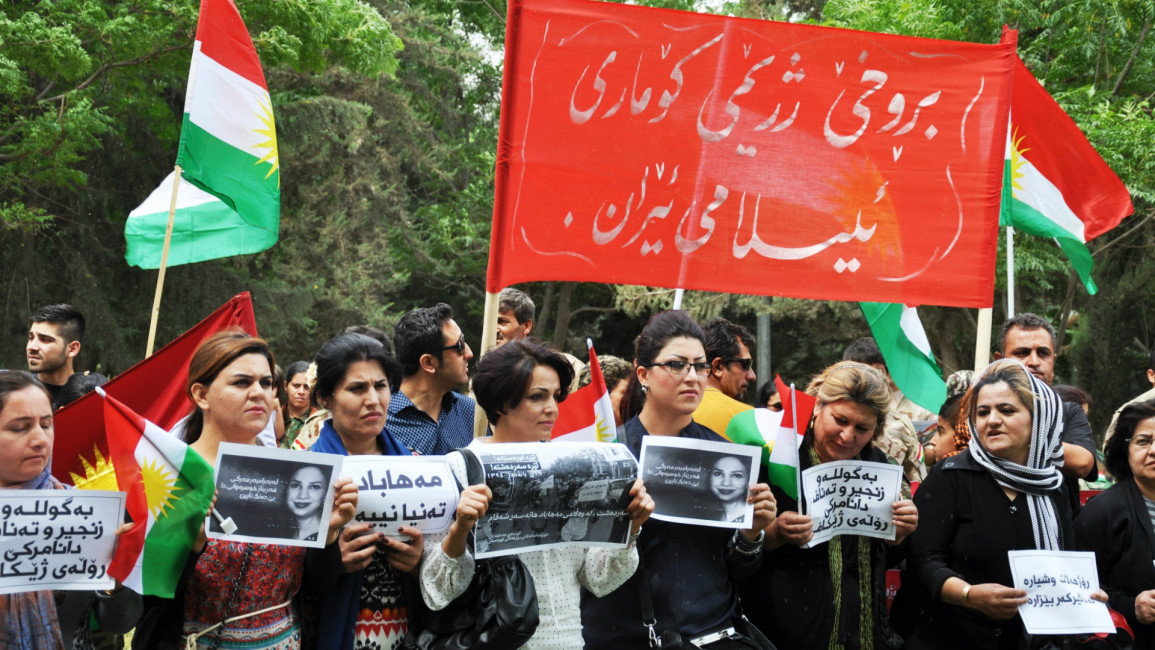
Fighting over Farinaz
The room was reportedly occupied by an Iranian intelligence ministry employee, who was attempting to sexually assault her before she escaped to her death. The hotel manager denies the reports.
On Monday, the deputy governor Western Azerbaijan province said that a suspect, currently in police custody, had been in a romantic relationship with Khosrawani, who had tried to escape the room after the hotel manager informed her mother of the relationship.
This is a story rejected by many, including Abullah Muhtadi, secretary-general of the Kurdish Komala party, who told Kurdish news agency Rudaw that there was evidence of a struggle.
"It is said there were signs of a fight between the two and her clothes were torn and there were bruises on her body," according to Muhtadi.
The tragic video of her death was widely shared on social media, and solidarity rallies took place over the weekend in Iranian universities, Kurdish parts of Turkey and Iraq, and even in Berlin and Canada.
Twitter Post
|
Twitter users expressed solidarity through the hashtags #JusticeForFarinaz and #Iran_Ignite.
However, outrage towards Farinaz' death appears to have been muddled with sectarian discourse, and criticism of Iran's foreign policy.
Twitter Post
|
Many tweets from the Kingdom of Saudi Arabia and advocates of the Saudi remgime emphasised Iran's neglect of minority and women's rights.
Twitter Post
|
It is true that Iran has an awful track-record concerning their treatment of minorities and women.
However, this is a little hypocritical considering Saudi Arabia's own reputation for rights abuses against women within law and practice. The Shia minority in Saudi has also been described as facing "entrenched discrimination".
Many prominent tweeters emphasised that Farinaz died "to preserve her honour", and this made her a hero.
Twitter Post
|
However, the sentiment infers that rape victims have somehow lost part of their "honour" - and, indeed, there have been instances in Iran, Kurdistan and Saudi Arabia of women being punished for being victims of sexual assault.
In Saudi Arabia in 2009, a woman was sentenced to 100 lashes and a year in prison after being gang-raped.
Reyhaneh Jabbari, 26, was executed this year after reportedly being raped by an employee of the Iranian intelligence ministry.
The stoning of Du'a Khalil Aswad, 17-year-old Iraqi Kurd, was caught on camera, and widely described as an "honour killing".
Of course, women's rights abuses are not limited to the Middle East; in England and Wales, an average of seven women every month are killed by a current or former partner.
Women's bodies have often become the battleground in fights for national, ethnic and religious causes; accusations of women's rights abuses often hide ulterior motives - for example the UK used the plight of Afghan women under the Taliban as a justification for occupying the country.
Colonised or war-torn countries have even been metaphorically portrayed as abused women in national songs and literature.
Women's rights abuses manifest in different places in different ways, and should not be hypocritically used for political purposes - whether to defend or attack states or peoples.
Therefore, although to many Kurds - probably the largest stateless population in the world - Farinaz has come to embody their plight in Iran and the wider region, maybe we need to leave symbolism at the door to focus on her as an individual.
Farinaz was a young woman who died, reportedly attempting to escape an awful attack.
And even if the widespread allegations turn out to be false, the story of sexual assault, which in this case ended fatally, is still true for millions of women - not only across the region - but across the world.




